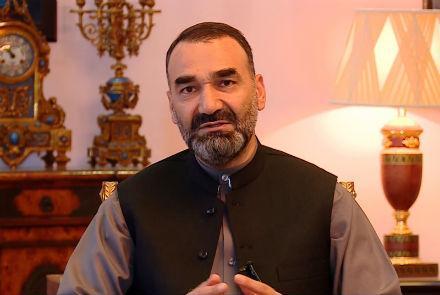Tension between Atta Mohammad Noor and the National Unity Government (NUG) has been clearly evident from the outset of the incumbent administration - which was formed in 2014 after a controversial presidential election.
However, relations between Noor and President Ashraf Ghani have faced numerous ups and downs over the past two months, which culminated in the apparent resignation of Noor and the Presidential Palace's acceptance thereof on Monday.
Going back to the time of the presidential elections, few people thought the two officials would mend the rift and one day work together.
Tensions remained following the establishment of the NUG and intensified when a rift between the president and Noor's fellow Jamiat party member, CEO Abdullah Abdullah, appeared.
But Noor spoke out against Abdullah last year and accused him of having no political power and of not securing Jamiat's share in the administration.
At the time, Noor announced that he would discuss the matter of Jamiat's power share directly with Ghani.
The talks pushed Noor to take steps to resign as governor of Balkh at the beginning of the current solar year – March.
“But a condition! We expect the full implementation of the commitments made in the negotiations with Mr. President (Ashraf Ghani),” Noor said in March.
Only four days after Nawroz festival (New Year), Ghani visited Mazar-e-Sharif city and praised Noor for his achievements in the province.
“This is exciting for the people of Balkh, the people of Afghanistan and for me. We should do bigger works and hopefully we will do it,” Ghani said in March.
It is believed that Noor handed Ghani his letter of resignation after this particular trip. At the time he reportedly put forward certain demands to Ghani and when these were not met, Noor came out in sharp criticism against the NUG.
This led to the formation of the National Coalition for the Salvation of Afghanistan - a committee led by Noor, First Vice President Abdul Rashid Dostum and Second Deputy CEO Mohammad Mohaqeq.
“Our call is not on the chief executive’s office. There is a small group of people, four or five, those who are in the Presidential Palace, they have grabbed the people’s rights,” Noor said in August 01.
Criticism against government continued at subsequent sessions of the coalition until Abdullah went to Balkh in a bid to put an end to rumors of a rift between himself and Noor.
“I want to insist that we should not put aside the language and the way of understanding, tolerance and coming together,” Abdullah said in August 16.
But this went further, and Noor announced in October he wanted to run for presidency in the next elections.
At the same time he stressed the need for reforms to be brought in election commissions.
“The commission is from them, commissioners from them, they appoint governors, (ballot) box is with them, they are counting them… I announce from here that it is clear who will be the president,” Noor said on October 31.
However, the rift between the Presidential Palace and Noor came to a peak a few weeks ago when Noor’s plane was stopped from flying to Kandahar where he was due to attend a political rally.
“This is the weakest point of governance and illegal, and uncivil ...; even it is inhuman,” Noor said on November 30.
Noor has been governor of Balkh for 14 years but was an ardent supporter of Abdullah in the 2009 presidential elections. At the time, Abdullah was a frontrunner along with former president Hamid Karzai - who went on to win.
At the time, he said he was a government official and that he would obey the president.


